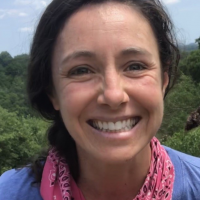Improving maternal health equity through workforce development at UNC
April 19, 2022
The United States is the only industrialized nation with a rising maternal mortality rate.
Communities of color in America have been facing nearly double the risk of pregnancy-related death compared to white Americans, even before the coronavirus pandemic. In February, the National Center for Health Statistics reported a 14% increase in mortality, from 754 deaths in 2019 to 861 deaths in 2020, with Black women experiencing mortality rates three times that of white women.
Research has shown that one of the most effective ways to address systemic racism in maternal health and reduce these inequities is through workforce training that centers equity. To that end, the Health Resources and Services Administration (HRSA) and the Maternal and Child Health Bureau (MCHB) have funded the Maternal Health Learning and Innovation Center (MHLIC) at UNC-Chapel Hill.
The Center, which has a hub housed in the Department of Maternal and Child Health (MCH) at the UNC Gillings School of Global Public Health, supports nine state-level maternal health initiatives (MHI) and three Rural Maternity and Obstetrics Management Strategies (RMOMS) across the nation as they aim to train an equitable maternal health workforce. It is organized into three cores that address innovation, engagement and policy. Each core includes experts in academia and practice from UNC’s Gillings School, School of Medicine and Social Work and subject matter experts from partnering organizations: the Georgia Health Policy Center, Reaching Our Sisters Everywhere (ROSE), R.A.C.E. for Equity, Ph Solutions, the Association of Maternal and Child Health Programs (AMCHP), and the American College of Obstetricians and Gynecologists (ACOG). Equity experts advise each core to ensure that focus is given to equitable practice and community perspectives.
Since November 2019, the Center’s mission has been to foster collaboration and learning to accelerate evidence-informed interventions that advance equitable maternal health outcomes through engagement, innovation and policy.

Amy Mullenix
“MHLIC plays a unique role in lifting up maternal health innovations from around the country, while simultaneously building the capacity of the maternal health workforce to advance these and other innovations,” said Amy Mullenix, MSPH, MSW, senior collaboration manager at MHLIC and adjunct instructor in MCH. “It builds on the strong history of MCH Department programs that support the workforce development of MCH practitioners in the field.”

Julia Reddy

Dr. Christine Tucker
A new report in the Maternal and Child Health Journal outlines the development of MHLIC and highlights gaps that the center aimed to address in its training and technical assistance. The report was co-authored by Mullenix; Julia Reddy, doctoral student in maternal and child health; Abby Cannon, MPH, MSW; Deitre Epps, CEO and founder of R.A.C.E. for Equity; and Assistant Professor Christine Tucker, PhD, MPH, with additional collaboration from doctoral students Isabel Morgan and Lauren Caton, and Associate Professor Dorothy Cilenti, DrPH.
MHLIC focuses on workforce development that centers racial and geographic equity through inclusive partnerships, technical assistance and training, peer learning, and accessible resources. Training programs involve assessment of the needs and goals of each MHI or RMOMS program to create equity-oriented, responsive, timely and engaging curricula. Peer communities of practice and coaching provide the programs with ongoing support that can address unique challenges and learn from one another.
MHLIC used a stakeholder assessment to identify specific needs that would guide maternal health training development, including telehealth implementation (which became critical during the COVID-19 pandemic), access to services for rural populations, racial inequities, and data use and dissemination.
In January 2021, MHLIC launched the Maternal Health Resource Center, an online repository that provides sources to enhance maternal health skills and knowledge.
“Partnering with an equity expert and prominent practice organizations, investing in the Intercultural Development Inventory assessment and intercultural coaching as tools for growth, and making time for authentic conversations to develop a shared language, mission and vision have been key in building equity into the design of the center and ultimately improving the quality and functioning of this national workforce development effort,” Tucker wrote in the report.
The pandemic continues to magnify maternal health inequities and underscores a continued demand for equity-informed maternal health practitioners. Building off lessons learned through its first two years, MHLIC will continue to collaborate with its organizational and community partners to co-design equity-centered learning and innovation.
Contact the UNC Gillings School of Global Public Health communications team at sphcomm@unc.edu.
